初中基础语法专题二、一般现在时与频率副词
初二英语一般现在时频率副词
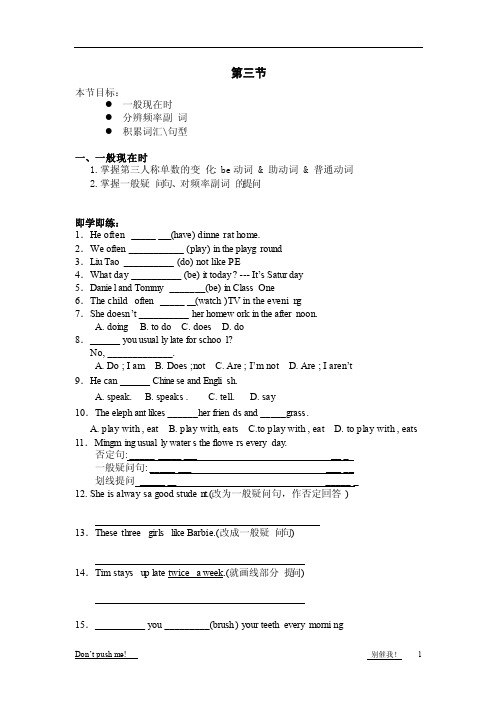
第三节本节目标:●一般现在时●分辨频率副词●积累词汇\句型一、一般现在时1.掌握第三人称单数的变化: be动词 & 助动词 & 普通动词2.掌握一般疑问句、对频率副词的提问即学即练:1.He often________(have) dinner at home.2.We often___________ (play) in the playgr ound3.Liu Tao __________(do) not like PE4.What day __________(be) it today? --- It’sSaturd ay5.Daniel and Tommy_______(be) in ClassOne6.The childoften_______(watch) TV in the evenin g7.She doesn’t__________her homewo rk in the aftern oon.A. doingB. to doC. doesD. do8.______ you usuall y late for school?No, _____________.A. Do ; I amB. Does ;notC.Are;I’mnotD.Are;Iaren’t9.He can ______ Chines e and Englis h.A. speak.B. speaks .C. tell.D. say10.The elepha nt likes______her friend s and _____g rass.A. play with , eatB. play with, eatsC.to play with , eatD. to play with , eats 11.Mingmi ng usuall y waters the flower s everyday.否定句: _____________ __ _一般疑问句: ________ ___ __划线提问_______ ______12. She is always a good studen t.(改为一般疑问句,作否定回答)13.Thesethreegirlslike Barbie.(改成一般疑问句)14.Tim staysu p late twice a week.(就画线部分提问)15.__________you _________(brush) your teetheverymornin g二、频率副词1.在句中的位置:位于be动词、助动词之后,行为动词之前2.给它们排序:often、hardly ever 、never、always、usuall y 、sometimes > > > > >即学即练:1.The sun risesin the west. (never)太阳从来不在西边升起2.She is on time.( never)她从来不守时3.Your grandp arent s go out for a walk. (hardly)你的爷爷奶奶几乎不出去散步4.—How oftendoes your sister surf the Intern et?—AboutA. threetimeB. threetimesC. threetime everydayD. threetimesa day 5.—does it take you to watchTV?— Aboutfortyminute s.A. How longB. How muchC. How oftenD. How many 6.—How does he get to work? —He a bike.—How long does it him to get from home to the office?—It him 20 minute s.A. rides; takes; takesB. rides; take; takesC. ride; takes; takesD. ride; take; takes7.---Ididn’tknowyoutakeabustoschool.---Oh, I ______ take a bus, but it is snowin g today.A. hardlyB. neverC. someti mesD. usuall y8.----Miss Gao is very popula r with her studen ts.----Yes. Her classe s are ______ lively and intere sting.A. seldomB. neverC. someti mesD. always9.-----How oftendo you go to a concer t?-----______ ever. I’mnotintere stedin that at all.A. Usuall yB. HardlyC. Almost10.My friend likessingin g and talkin g with others. But I oftenstay at home to watchTV. So my friend is()than me.A. seriou serB. more seriou sC. calmerD. more outgoi ng三、看图填空The firstTree Planti ng Day was in the year 1987 in our countr y. Everyyear, on _________ 12th, office worker s, soldie rs, studen ts and old people go out to planttrees.It was Planti ng Day last Sunday; our classwent to planttrees. We __________at the school gate at sevenin the mornin g.Then we went to a park aboutfive kilome ters_________ from our school by bus.____ we arrive d, we starte d to work at once. A bus brough t many youngtreesto the park. We took them from the bus, and carrie d them to the rightplace. We worked in pairs. We took turnsto _________ holesin the ground. It was hard work, but we enjoye d it. When the holeswere deep ____________, we __________the youngtreesin them, and then ___________ them again. Afterthat we got waterfrom a river, and _____________ the trees.At the end of the day, we had ___________ over threehundre d trees.四、完形填空One day, a Chines e studen t goes to studyEnglis h in Englan d. His family name is Su n. It is the 1 as the word "sun." Englan d is a countr y with 2 . It is oftencloudy or misty(多雾的), and it 3 again,so the days there4 get much sunshi ne(阳光) all t he year. When the Chines e studen t gets to London, a tall5 police man with a lon g face 6 his passpo rt(护照) to check(检查) it. The police man findsthe Chines e na me "sun" in the passpo rt. He7 its pronou nced(发音) just like the8 word "sun". So he says to the Chines e studen t, "Your name is Sun, you're wanted here. You brin gsunshi ne9 Englan d, so we don't want you to10 ." They smile.()1. A.same B.differ ent C.like D.as()2. A.good weathe r(天气) B.bad people C.bad weathe r D.good people()3. A.rainsB.rainin g C.is rainsD.to rains()4. A.don't B.doesn't C.also D.often()5. A.Chines e B.ChinaC.Englis h D.Japane se()6. A.is open B.opensC.openin g D.to open()7. A.thinkB.thinki ng C.to thinkD.thinks()8. A.Englis h B.Chines e C.JapanD.French()9. A.at B.of C.to D.for()10. A.go away B.goes away C.goingaway D.away。
英语七年级英语上册Unit-2-语法-一般现在时和频率副词讲义牛津深圳版
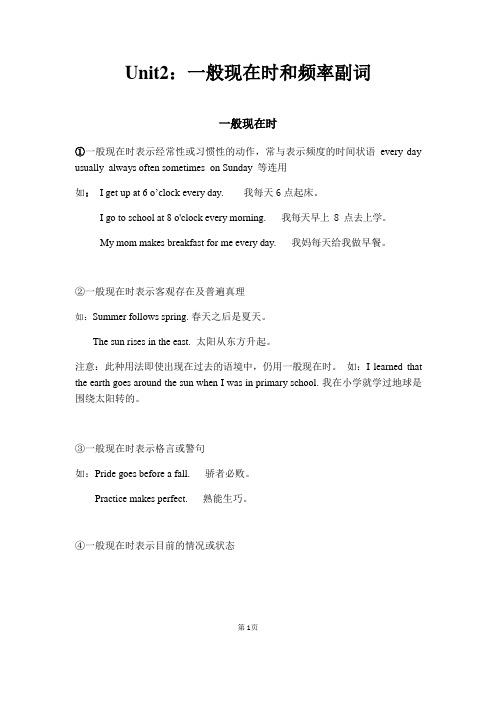
Unit2:一般现在时和频率副词一般现在时①一般现在时表示经常性或习惯性的动作,常与表示频度的时间状语every day usually always often sometimes on Sunday 等连用如:I get up at 6 o’clock every day. 我每天6 点起床。
I go to school at 8 o'clock every morning. 我每天早上 8 点去上学。
My mom makes breakfast for me every day. 我妈每天给我做早餐。
②一般现在时表示客观存在及普遍真理如:Summer follows spring. 春天之后是夏天。
The sun rises in the east. 太阳从东方升起。
注意:此种用法即使出现在过去的语境中,仍用一般现在时。
如:I learned that the earth goes around the sun when I was in primary school. 我在小学就学过地球是围绕太阳转的。
③一般现在时表示格言或警句如:Pride goes before a fall. 骄者必败。
Practice makes perfect. 熟能生巧。
④一般现在时表示目前的情况或状态第1页如:I am a teacher. 我是教师。
You are a student. 你是学生。
以here, there 等开始的倒装句,表示动作正在进行。
如:Here comes the bus. = The bus is coming. 车来了。
There goes the bell. = The bell is ringing. 铃响了。
一般现在时的构成①be 动词:主语+ be (am, is, are) + 其它。
如:I am a boy. 我是一个男孩。
You are a girl. 你是一个女孩。
一般现在时频率副词

目录
• 频率副词在一般现在时中的作用 • 一般现在时中常用的频率副词 • 一般现在时频率副词的用法与注意事项 • 一般现在时频率副词的练习与解析 • 一般现在时频率副词的常见错误与纠正方
法
01
频率副词在一般现在时 中的作用
定义与特点
定义
频率副词是一类表示动作发生频率的副词,常用于一般现在时态中,描述某个 动作发生的次数或频繁程度。
通过使用频率副词,可以表达说话者 对某个动作发生频率的主观评价和态 度,如“他总是迟到”表示说话者认 为对方经常迟到。
02
一般现在时中常用的频 率副词
always(总是)
总结词
表示动作或状态始终如此,没有例外。
详细描述
always用于强调动作或状态的持续性和一贯性,表示始终如此,没有例外。它通 常用于描述习惯性或反复发生的动作或状态,强调动作或状态始终保持不变。
常见错误二:频率副词与时间状语的搭配不当
总结词
频率副词与时间状语的搭配不当是指在使用 频率副词时,没有正确地与时间状语进行搭 配,导致句子意思表达不准确。
详细描述
例如,在句子"I usually watch TV on weekends"中,时间状语"on weekends" 应该与频率副词"usually"进行搭配,表示 通常在周末看电视。因此,正确的句子应该 是"I usually watch TV on weekends."
频率副词与时间状语连用时的注意事项
频率副词与时间状语连用时,应放在时间状语之前,例如“我每周都去健身房锻 炼”,在这个句子中,“每周”是时间状语,“都”是频率副词,应放在时间状语 “每周”之前。
Unit 4 Time to celebrate--单元语法:频率副词和一般现在时+练习(教师版)
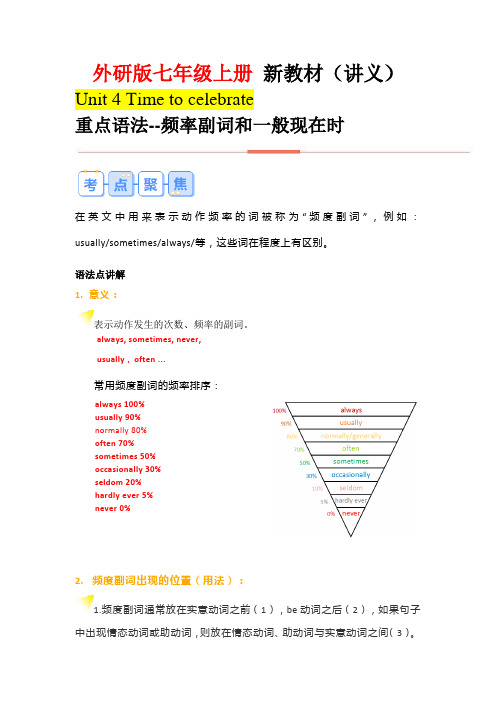
外研版七年级上册新教材(讲义)Unit 4 Time to celebrate重点语法--频率副词和一般现在时在英文中用来表示动作频率的词被称为“频度副词”,例如:usually/sometimes/always/等,这些词在程度上有区别。
语法点讲解1. 意义:表示动作发生的次数、频率的副词。
always, sometimes, never,usually,often ...常用频度副词的频率排序:always 100%usually 90%normally 80%often 70%sometimes 50%occasionally 30%seldom 20%hardly ever 5%never 0%2. 频度副词出现的位置(用法):1.频度副词通常放在实意动词之前(1),be动词之后(2),如果句子中出现情态动词或助动词,则放在情态动词、助动词与实意动词之间(3)。
如:I always do homework in the afternoon.(1)He is never kind to us.(2)She can never know your secret.(3)2.频度副词的特殊位置:表示次数的频度副词,如once, twice,可以放在动词后或句末(4);有的频度副词也可放在句首表示强调(5)。
如:The car broke down twice.(4)Sometimes I go fishing with my dad.(5)3. 常用频度副词精讲:1. always 频率最高,表示动作重复、状态继续,表示“一直、总是”,其反义词为never。
always等与not连用时,表示部分否定。
如:The rich are not always happy. 有钱的人并不总是快乐的。
如果要变为否定句,应将always改为never才能全部否定。
如:Li Ping is always late for school. 李平上学总是迟到。
初中语法 频度副词的用法

初中语法频度副词的用法频度副词是用来描述动作或事件发生的频繁程度的副词。
在初中语法中,频度副词的用法是非常重要的。
它们可以帮助我们准确地表达某件事情发生的频率,并且可以让我们的语句更加生动有趣。
下面我将详细介绍频度副词的用法。
1. 频度副词的分类频度副词可以按照频率的程度分为六个等级:always(总是)、usually(通常)、often(经常)、sometimes(有时)、rarely(很少)、never(从不)。
它们根据动作或事件发生的频繁程度从高到低进行排列。
2. 频度副词的位置通常情况下,频度副词位于行为动词之前,表示行为动作的频率。
例如:- I always go to bed early.- She usually brushes her teeth after meals.3. 频度副词的变化有些频度副词可以通过在词尾加上"-ly"来构成,例如usually和rarely。
而有些频度副词则是不规则的,如always、often、sometimes和never。
4. 频度副词的修饰范围频度副词可以修饰行为动词、形容词和副词。
例如:- He always speaks English fluently.(修饰行为动词)- The weather is usually sunny.(修饰形容词)- She walks to school sometimes.(修饰副词)5. 频度副词的其他用法除了修饰动词、形容词和副词外,频度副词还可以在句子中起到其他的作用。
例如:- Usually, I prefer to study in the morning.(作为句子开头的插入语)- He rarely goes to the cinema.(作为独立的句子成分)- I never thought I would see you here.(强调某种情感或感叹)6. 频度副词的注意事项在使用频度副词时,需要注意以下几点:- 频度副词通常放在一般现在时的句子中,表示习惯或经常性的动作。
初中英语语法知识之一般现在时
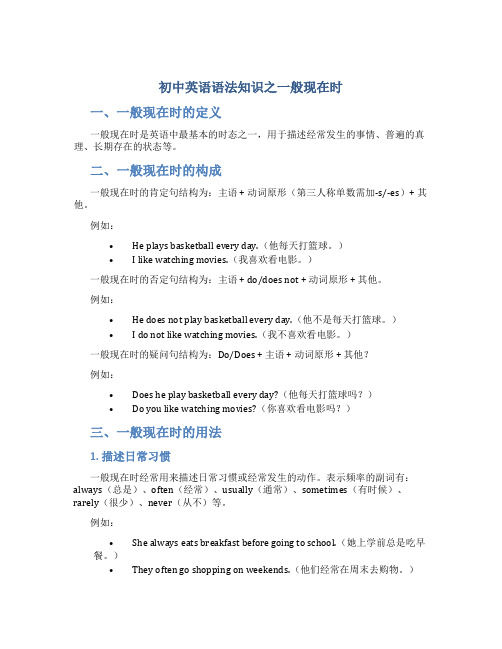
初中英语语法知识之一般现在时一、一般现在时的定义一般现在时是英语中最基本的时态之一,用于描述经常发生的事情、普遍的真理、长期存在的状态等。
二、一般现在时的构成一般现在时的肯定句结构为:主语 + 动词原形(第三人称单数需加-s/-es)+ 其他。
例如:•He plays basketball every day.(他每天打篮球。
)•I like watching movies.(我喜欢看电影。
)一般现在时的否定句结构为:主语 + do/does not + 动词原形 + 其他。
例如:•He does not play basketball every day.(他不是每天打篮球。
)•I do not like watching movies.(我不喜欢看电影。
)一般现在时的疑问句结构为:Do/Does + 主语 + 动词原形 + 其他?例如:•Does he play basketball every day?(他每天打篮球吗?)•Do you like watching movies?(你喜欢看电影吗?)三、一般现在时的用法1. 描述日常习惯一般现在时经常用来描述日常习惯或经常发生的动作。
表示频率的副词有:always(总是)、often(经常)、usually(通常)、sometimes(有时候)、rarely(很少)、never(从不)等。
例如:•She always eats breakfast before going to school.(她上学前总是吃早餐。
)•They often go shopping on weekends.(他们经常在周末去购物。
)2. 表达客观事实或普遍真理一般现在时也被用来表达客观事实或普遍真理。
例如:•The Earth revolves around the sun.(地球绕太阳运行。
)•Water boils at 100 degrees Celsius.(水在100摄氏度沸腾。
often-never-always等频率副词与一般现在时的关系
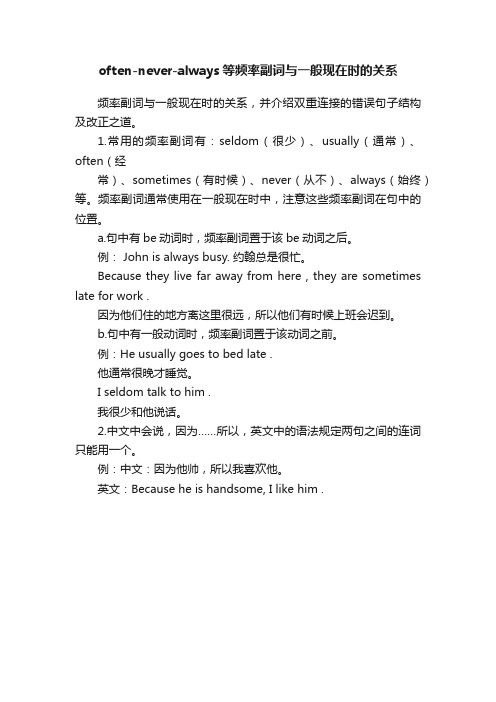
often-never-always等频率副词与一般现在时的关系
频率副词与一般现在时的关系,并介绍双重连接的错误句子结构及改正之道。
1.常用的频率副词有:seldom(很少)、usually(通常)、often(经
常)、sometimes(有时候)、never(从不)、always(始终)等。
频率副词通常使用在一般现在时中,注意这些频率副词在句中的位置。
a.句中有be动词时,频率副词置于该be动词之后。
例: John is always busy. 约翰总是很忙。
Because they live far away from here , they are sometimes late for work .
因为他们住的地方离这里很远,所以他们有时候上班会迟到。
b.句中有一般动词时,频率副词置于该动词之前。
例:He usually goes to bed late .
他通常很晚才睡觉。
I seldom talk to him .
我很少和他说话。
2.中文中会说,因为……所以,英文中的语法规定两句之间的连词只能用一个。
例:中文:因为他帅,所以我喜欢他。
英文:Because he is handsome, I like him .。
七年级英语下册语法专项一般现在时知识点梳理
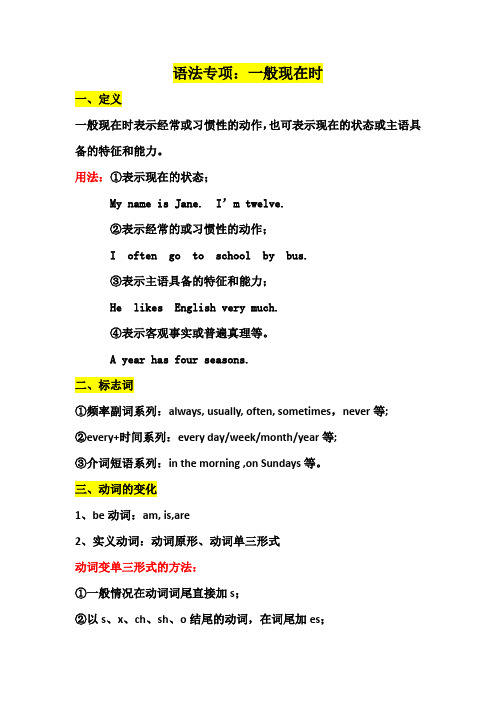
语法专项:一般现在时一、定义一般现在时表示经常或习惯性的动作,也可表示现在的状态或主语具备的特征和能力。
用法:①表示现在的状态;My name is Jane. I’m twelve.②表示经常的或习惯性的动作;I often go to school by bus.③表示主语具备的特征和能力;He likes English very much.④表示客观事实或普遍真理等。
A year has four seasons.二、标志词①频率副词系列:always, usually, often, sometimes,never等;②every+时间系列:every day/week/month/year等;③介词短语系列:in the morning ,on Sundays等。
三、动词的变化1、be动词:am, is,are2、实义动词:动词原形、动词单三形式动词变单三形式的方法:①一般情况在动词词尾直接加s;②以s、x、ch、sh、o结尾的动词,在词尾加es;③以辅音字母+y结尾的动词,把y变成i,再加es;以元音字母+y 结尾的动词直接+s;如:fly –flies play –plays④特殊变化:have has四、句型结构(1)含有be动词的一般现在时的句型a.肯定句主语+am/is/are+其他.b.否定句主语+am/is/are+not+其他.c.一般疑问句Be动词+主语+其他?肯定回答:Yes,主语+be动词.否定回答:No,主语+be动词+not.d.特殊疑问句特殊疑问词+be动词+主语+其他?(2)含有实义动词的一般现在时的句型a.肯定句主语+动词原形+其他.主语+动词单三形式+其他.b.否定句主语+don’t+动词原形.主语+doesn’t+动词原形.c.一般疑问句Do/Does +主语+动词原形+其他?肯定回答:Yes,主语+do./does.否定回答:No,主语+don’t./doesn’t.d.特殊疑问句特殊疑问词 +do/does+主语+动词原形+其他?注:当主语是非你(you)非我(I)非复数时,动词要用单三形式。
- 1、下载文档前请自行甄别文档内容的完整性,平台不提供额外的编辑、内容补充、找答案等附加服务。
- 2、"仅部分预览"的文档,不可在线预览部分如存在完整性等问题,可反馈申请退款(可完整预览的文档不适用该条件!)。
- 3、如文档侵犯您的权益,请联系客服反馈,我们会尽快为您处理(人工客服工作时间:9:00-18:30)。
初中基础语法-- 专题二、动词的时态()1.Louis computer games at weekends.A. playsB. is playingC. has playedD. was playing()2.The Greens will visit Hainan as soon as they to China.A. comesB. comeC. cameD. will come一、一般现在时一、一般现在时的功能1.表示事物或人物的特征、状态。
The sky is blue.2.表示经常性或习惯性的动作。
I get up at six every day.3.表示客观现实。
The earth goes around the sun.常搭配的时间状语:every day/evening, often, always, usually,sometimes, usually, never等二、一般现在时的构成1. be动词:主语+be(am,is,are)+其它。
I am a boy.2.行为动词:主语+行为动词(+其它)。
We study English.当主语为第三人称单数(he, she, it)时,要在动词后加"-s"或"-es"。
Mary likes Chinese.三、一般现在时的变化1. be动词的变化。
◇否定句:主语+ be + not +其它.He is not a worker.◇一般疑问句:Be +主语+其它?-Are you a student? -Yes. I am. / No, I'm not.◇特殊疑问句:疑问词+一般疑问句? Where is my bike?2.行为动词的变化。
☆否定句:主语+ don't( doesn't ) +动词原形(+其它). I don't like bread.He doesn't often play.☆一般疑问句:Do( Does ) +主语+动词原形+其它?- Do you often play football?- Yes, I do. / No, I don't.- Does she go to work by bike? - Yes, she does. / No, she doesn't.☆特殊疑问句:疑问词+一般疑问句? How does your father go to work? 四、动词加s/es的变化规则1.一般情况下,直接加-s,cook-cooks, milk-milks2.以s. x. sh. ch. o结尾,加-es,guess-guesses, wash-washes, watch-watches, go-goes 3.以“辅音字母+y”结尾,变y为i, 再加-es,study-studies巧学妙记用好一般现在时,时间状语要牢记基本用法要记清,动作习惯经常性客观真理和能力,有时还表将来时谓语若为行为动,形式要由主语定主语人称是三单,动词要把-s/es添句中若把助词用,谓语动词用原形五、一般现在时用法专练:一、写出下列动词的第三人称单数drink ________ go _______ stay ________ make ________look _________ have_______ pass_______ carry ____come________ watch______ plant_______ fly ________study_______ brush________ do_________ teach_______二、用括号内动词的适当形式填空。
1. He often ________(have) dinner at home.2. Daniel and Tommy _______(be) in Class One.3. We _______(not watch) TV on Monday.4. Nick _______(not go) to the zoo on Sunday.5. ______ they ________(like) the World Cup?6. What _______they often _______(do) on Saturdays?7. _______ your parents _______(read) newspapers every day?8. The girl _______(teach) us English on Sundays.9. She and I ________(take) a walk together every evening.10. There ________(be) some water in the bottle.11. Mike _______(like) cooking.12. They _______(have) the same hobby.13. My aunt _______(look) after her baby carefully.14. You always _______(do) your homework well.15. I _______(be) ill. I’m staying in bed.16. She _______(go) to school from Monday to Friday.17. Liu Tao _______(do) not like PE.18. The child often _______(watch) TV in the evening.19. Su Hai and Su Yang _______(have) eight lessons this term.20. -What day _______(be) it today? -It’s Saturday.三、按照要求改写句子1. I do my homework every day. (改为一般疑问句,作否定回答) ________________________________________________________ ____________________________2. She likes milk. (改为一般疑问句,作肯定回答)___________________________________________________________________________________3. She is always a good student.(改为一般疑问句,作否定回答)________________________________________________________________________________________4. We go to school every morning.(改为否定句)_______________________________________________________5. He speaks English very well.(改为否定句)___________________________________________________6. I like taking photos in the park.(对划线部分提问)________________________________________________________7. John comes from Canada.(对划线部分提问)___________________________________________________8. Simon and Daniel like going skating.(改为否定句)___________________________________________________五、改错(划出错误的地方,将正确的写在横线上)1. Is your brother speak English? __________________2. Does he likes going fishing? __________________3. He likes play games after class. __________________4. Mr. Wu teachs us English. __________________5. She don’t do her homework on Sundays. _________________副词在句中用作状语,修饰动词、形容词、副词、词组或整个句子。
包括表示时间、地点、方式、频度、程度等的副词。
频度副词1. 频度副词的特点表示动作发生的次数,常见的有:always>usually>often>sometimes>seldom(很少)>hardly>never(决不)(按频率大小排列),once/twice,/three times a week/month/year等。
always和never、often和seldom各是一对反义词2.在句中的位置通常位于行为动词之前,be动词、助动词、情态动词之后:He often comes to see us. He is seldom late for school.sometimes, often, usually等可位于句首(因为强调或对比):Sometimes he goes there by bus.3.hardly, seldom和never本身带有否定的意义He hardly goes to see a movie, does he?4. always在否定句中的位置:位于not之后She doesn’t always come late. 她并非总是迟到。
5.对频度副词进行提问时,常用how often--How often do you walk to school?—I sometimes walk to school.选择题()1.—Why does your mother get up so early?---Because she has to catch the early bus every morning.A. alwaysB. neverC. sometimesD. seldom()2.I play basketball after school .A. yesterdayB. tomorrowC. onceD. twice a week()3.—How often your father to you?—Once a month.A. do, writeB. does, writeC. is, writeD. is, writes()4.—Where do you have lunch?-- I eat lunch at school. I always lunch at home.A. often, haveB. always, haveC. never, eatsD. never, have ()5. I walk to the train station. I live too far away from it.A. neverB. sometimesC. nowD. often()6.--How do they come to see you? --.Once a week.A. manyB. sometimesC. longD. often一般现在时和频度副词综合练习一、选择题()1.—What do you know about the children’s plan?---Well, Tom with other boys to go and the game.A. want, watchB. wants, watchesC. wants, watchD. want, to watch ()2.—Where are the students now?---They are in the classroom. They are all busy ready for the exam.A. gettingB. getC. to getD. got()3.—Where is your father?---He’s gone to Australia. He’ll be back next month.A. sometimesB. sometimeC. some timeD. some times()4.—All my family in company?---That must be very strange.A. works, sameB. are working, differentC. work, the sameD. works, a()5.—What’s your hobby?---I enjoy piano and I also twice a week.A. playing the, play the footballB. playing the, play footballC. to play, play footballD. playing, playing football()6.—Do you have to do a lot of homework at weekends?---No. We have any homework at weekends.A. sometimesB. usuallyC. alwaysD. seldom()7.—How often Wendy computer club meetings?--.Once a week.A. does, attendB. does, joinC. do, take part inD. do, join in ()8.—Is Lily a good student?---Of course. She always finishes her homework on time. She leaves it for tomorrow. A. always B. never C. usually D.sometimes二、完形填空In England, when you are ill, you go to see a doctor near your home. __1__ are men and women, and you can say who you __2__. You 3 only spend ten minutes with the doctor. They can u sually say what’s the __4__ very quickly, and give you a prescription (处方)for some medicine.Most people only go to __5__ doctors whey they are ill. People with colds don’t go to the doctor but to the medicine shop to buy medicine. Doctors only come to your home when you’re very ill. In an emergency(急诊) you can __6__ an ambulance (救护车) at 999. The ambulance takes __7__ to hospital. Friends come to see you __8__ at certain hours of the day, but they don’t __9__ there for a long time. You don’t give money to the doctor __10__ to the hospital when the doctor comes to see you in England. But when you are eighteen years old, you must give money for prescriptions. ( )1. A. Teachers B. Doctors C. Friends D. Parents( )2. A. go with B. prefer C. call D. say( ) 3. A. usually B. never C. seldom D. hardly( ) 4. A. ill B. matter C. wrong D. bad( ) 5. A. his B. our C. your D. their( ) 6. A. tell B. say C. call D. speak( ) 7. A. me B. you C. him D. her( ) 8. A. in hospital B. at home C. at school D. at the chemist’s ( ) 9. A. come B. stay C. know D. have( ) 10. A. than B. and C. or D. but一、选择题1. (2009·沈阳中考) -Does Alice often work until 2 a.m.?-No, she ________ does.A. nearlyB. certainlyC. seldomD. always2. (2009·江西中考) –I didn’t know you take a bus to school.-Oh, I ______ take a bus, but it is snowing today.A. hardlyB. neverC. sometimesD. usually3. (2009·阜康中考) -Were you often late for school last term, Tom?-No, _______. I got to school early every day.A. AlwaysB. UsuallyC. SometimesD. Never4. (2009·山西中考) –How often do you go to a concert?-_______ ever. I’m not interested in that at all.A. UsuallyB. HardlyC. Almost5. (2009·常州中考) -John sings so well. Has he ever been trained?-No. He learns all by himself. He ________ goes to any training class.A. usuallyB. oftenC. neverD. even6. (2009·漳州中考) –Miss Gao is very popular with her students.-Yes. Her classes are ______ lively and interesting.A. seldomB. neverC. sometimesD. always7. (2008·攀枝花中考) We are going to have a party ________ next week.A. sometimeB. some timeC. sometimesD. some times8. (2008·芜湖中考) Sandy is so careful that she ________ makes mistakes in her homework.A. usuallyB. seldomC. oftenD. Always CADBCDAB。
